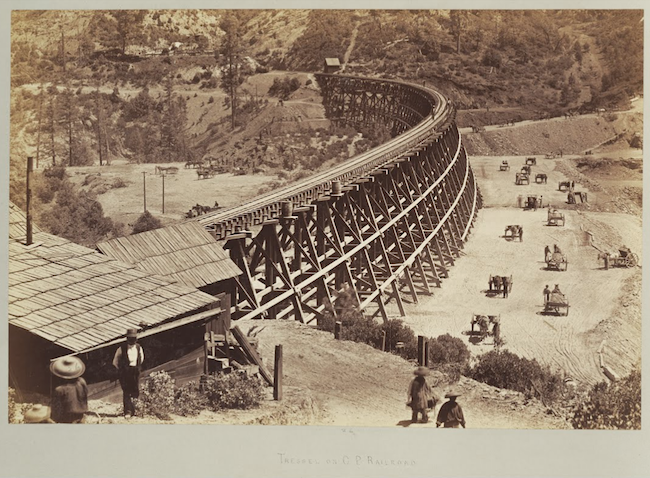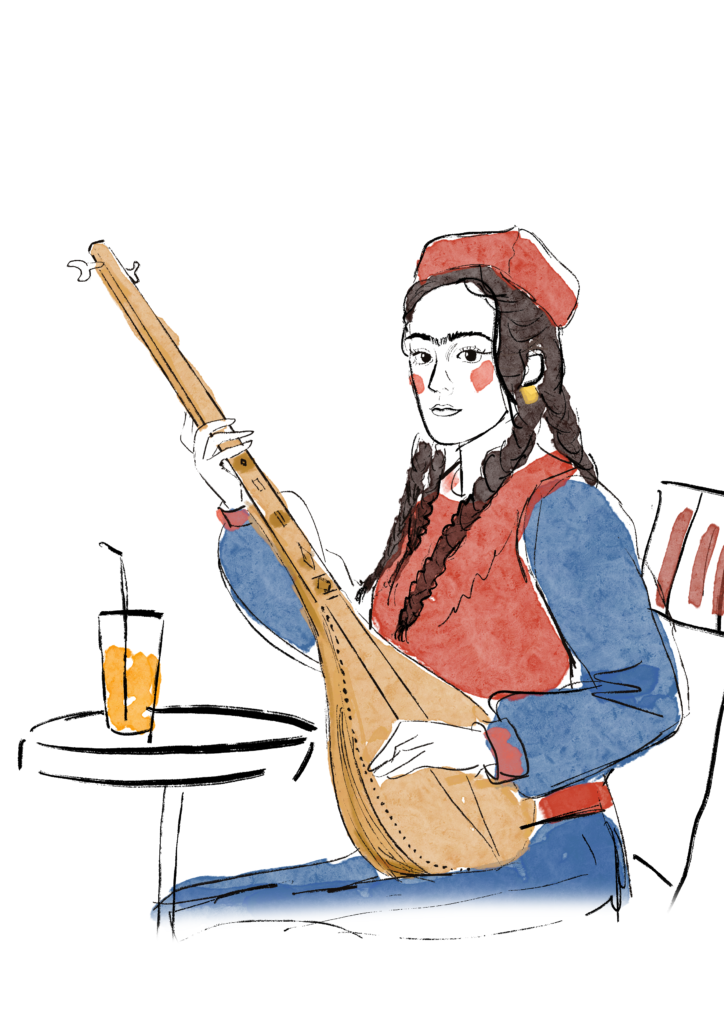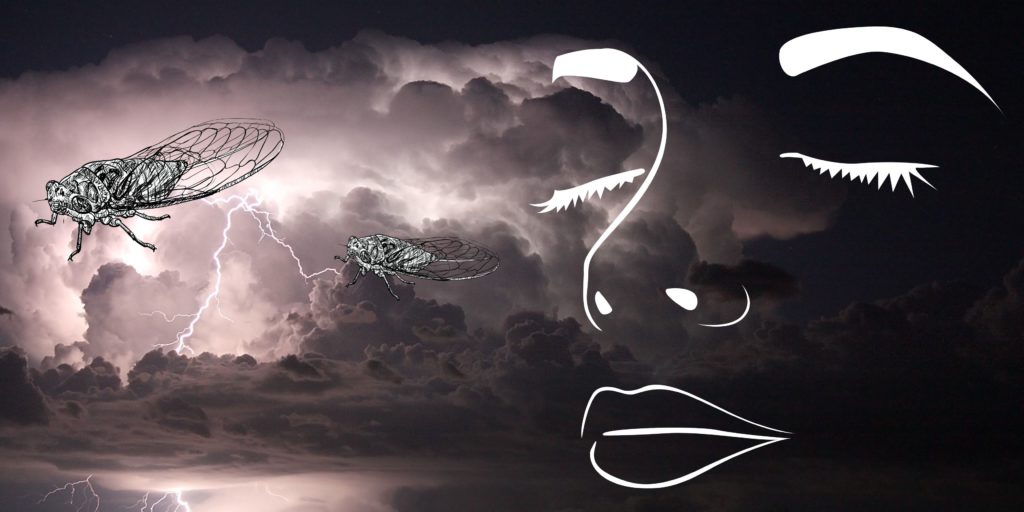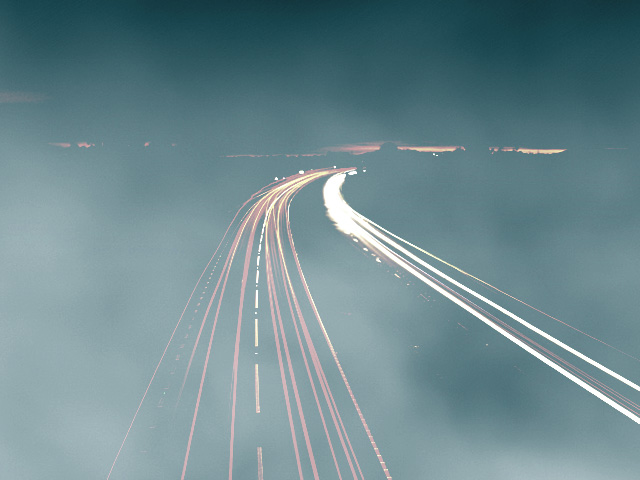On the 150th anniversary of the completion of the First Transcontinental Railroad, Paisley Rekdal revisits the legacy of the Chinese railroad workers who reshaped the American West.

May 13, 2019
Utah Poet Laureate Paisley Rekdal has been hard at work on a book-length poem and multimedia project about the Transcontinental Railroad. Titled “West: A Translation,” the book centers the histories of Chinese workers as well as African American and Native workers who built the railroad as well as the impact of the railroad on the land and our cultural memory today. Commissioned by the Utah Arts Council and Spike 150 for the 150th anniversary of the completion of the railroad on May 10, 2019, “West: A Translation” is written as a sonnet cycle, and Rekdal has been performing it alongside audio recordings and video projections.
The more than 60-page work is expansive, broken up into sections. The titles of the poems we’ve excerpted below from the longer work come from characters in a Chinese poem written by a detainee from Angel Island elegizing the suicide of another detainee. As Rekdal shared with us:
This anonymous poem, and Angel Island’s detention of Cantonese people, was a result of the Chinese Exclusion Act passed in 1882, thirteen years after the Transcontinental was completed. I see these two events in history as linked, as the Chinese—once seen as a source of cheap, inhuman labor—were sought after by the Central Pacific Railroad in order to complete the Transcontinental. After the railroad was completed, however, the Chinese were seen as a threat to both white labor and ideas of white purity. My poem, “West,” translates the Angel Island poem character by character through the Chinese and other railroad workers’ stories, as well as the railroad’s cultural impact on America. Several of the poems also use found text and language culled from 19th Century journalistic and novelistic accounts of the workers and the railroad.
“[W]hat fascinates me about the Transcontinental is that as much as it unifies it also divides in as much as it offers people more and more economic opportunities that also take some of those opportunities away for other people,” Rekdal told Diane Maggipinto of Utah NPR member station KUER. “[It]’s important to see the Transcontinental in its full ambivalence ambiguous and complex glory to really get a sense of what that history means.”
The following poems are short excerpts from the much longer work, “West: A Translation.” Rekdal performed the poem at the National Postal Museum for the Smithsonian Institute on May 11 alongside Regie Cabico and Marilyn Chin, and at the Salt Lake Acting Company on May 6 and 7, before staged readings of David Henry Hwang’s “The Dance and the Railroad.”
噩 耗/Sorrowful news
sings the telegram, and Lincoln’s body slides
from DC to Springfield, his infant son, Willie, boxed
beside him. Buffalo, Cleveland, Painesville, Ashtabula.
Two coffins, 1700 miles, 14 days on 14 railroads.
One day a great line will unite us, the president
promised. Father and son displayed
capital after capital. Louisville, New Albany,
Baltimore, Chicago. The black trains beach
upon a tide of roses. Can you believe still
in the promise of this union? I saw, General Dodge
wrote, a little negro drop on his knees and offer prayers.
While above the dark news thrums on wires, gone
gone gone gone, across poles tall as the ones
from which the president ordered 38 Sioux be hung.
實可/Indeed
“The truth is, they are getting smart,” E.B. Crocker
They look down even with contempt
upon our newer, rougher civilization: they do not
identify with this country; their great care
is to be buried at home, though our demand for them
daily increases. We want 10,000
of them, we want 100,000, we want a half a million
to bring the price of labor down. There shall be
500 cubic feet of air between them, restrictions
made upon their testimony
against white men, they shall not walk
on the sidewalk or marry a native
man or woman. All this, and they will keep
the Negro steady. They are quiet, good cooks, good
at almost everything they are put at. Indeed,
the only trouble is, we cannot talk to them.
尸/Body
“Their body’s labor will override the prejudices of the soul,” Samuel Bowles
A car load passed last night, their bones
returned in barrels marked “pickles.” Thick
as bees, ants, locusts, Celestials
lay siege to Nature
in her strongest citadel. Their genius
is imitation; show them once
to do a thing, and their education
is complete. Wherever you put them,
you’ll find them good. They can withstand
freezing, hunger, thirst and heat; their simple,
narrow, but not dull minds running
in old grooves. Congealed quantities. Crystals
of social substance. Eunuchated
as boys or sodomites, they breed,
defunct, in the heat of germs. They can be shipped
to shore in great quantities. Even their clothes come,
identical, studded with rivets.
回/Return
If falling leaves return to roots, what grows
when leaves cannot be gathered?
What returns if not the body? What remains
if not the soul? Who is to say these graves
empty of their bones mean only loss, not
that these men escaped death’s hold entirely:
they are not home, but they are not here,
either, or have become so full of here
we need another word than gone. So throw
out the cormorant, its leg tied with silk ropes.
Let it drag the air for memory. Over and over,
as many times as you want. You can’t snare
what isn’t missing. This country claimed their bodies.
It never trapped their souls.
悔/Regret
from Anthony Trollope’s North America, 1862
This country reels from war. It strains
beneath the weight of an excessive patriotism
which compels the North to crush
all those who dare rebel against
the Stars and Stripes’ authority. Nothing
is more tyrannical than strong popular feeling
among a democratic people. Women, too,
a certain class, appear infected by it, who drag
their misshapen, dirty mass of battered
wireworks they call crinolines here
through the station, demanding every
strangers’ attention and protection,
while haranguing any man they suspect
of shying from the fight. The touch
of a real woman’s dress I find delicate:
but these blows from a harpy’s fins
are loathsome. She inserts herself
into the carriage, looks you square in the face,
and you rise from a deference
to your own convictions to give her
your seat, even as men–laborers many, some
infirm or aged—stand
to let her pass. Some matrons even now demand
a private carriage: to guard, they say,
their sensibilities. But I regret I’ve seen
no delicacy in them, and why should men
expose themselves to cutpurses and ruffians
if they are gentlemen? I wonder, if the train
makes some free to demand protection,
when the tasks now done by men have shifted
to the shoulders of women, will women themselves
complain? What shall they regret
when the spirit of their democracy’s reshaped
in the image of their grievance? At night,
in the train, I watch these women rock
in the oil lamps’ brassy glow, our carriage gleaming
with teakwood and soft leathers until,
for a moment, all my companions
look companionable, their faces bright, contented,
whole. The train rocks, and the lady
beside me drops her book, and when
I bend to retrieve it, she looks up,
her broad face blushing in the gloam,
for a moment, both of us transported
to some notion of our better selves. Is it sentiment
or labor that finally cements a nation,
and can strong feeling but only sow
more division when the cause for it
subsides? “Union Station,” the porter calls,
and a man limps past, his cheek
bisected with a livid scar my female
companion notes with melting sympathy
a moment, before he shrugs his traveling case
close to his side, and once more the lady
turns to face her window.
含 愁/ Hold Sorrow
Imagine a farm, a famine, your mother promised
you’ll learn tailoring. Imagine your father pocketing
$600. Now here’s the boat, its black planks wet
with fog. Here is the room holding a bed, no
mirror, your washbasin. You have one window, wired,
to face the street. He will keep his pants on,
his greasy shirt, his shoes. Imagine the quarter
pressed after into your palm. Your street
will be named for presidents you never heard of,
the city’s lights like strings of blood
in rain puddles. Imagine, if you could, you’d carve
your father’s name on a knife tip. At night,
only the train cries. Your door locks from outside.
思 鄉/ Miss Home
I pick up my life and take it
with me and I put it….
Any place…. that is not Dixie,
Langston Hughes
Ways to die: blasting accident, derailment, boiler
crack. Crushed between trains crossing
at night. Electrocution, bad food, heart attack.
You can work yourself to death, a la John,
a la Henry. Or you can stay at home, and die
anyway: fist and noose, club, gun, knife
in the back. Gossip. Sharecropping. Bottle of rum
with gas-soaked rag. What is freedom
but the power to choose
where you won’t die? What is a train
but the self once yoked to terror loosed
into a force that glides
on heat and steam? You’re so far
from Mississippi, the UP boss said
when we hit Rock Springs. Don’t you miss
your home? Miss home? I told him.
I’m hoping to miss it entirely.
來/Journey
Robert Smithson on AJ Russell’s photograph of the Transcontinental
This excessiveness of men
spilling, crowding
to mark their X of time
and money, I find
lamentable— their little moment
composed of paper
and light: alienated
spike, relic
in the hands of those willing
themselves be relics, too. Nothing
so linear as human
ego and desire, while the past
turns and returns, indifferent, spirals
like these pelicans journeying
over the red
waters of Rozel, streams
of purple; yucca rimed
with pustules of dust.
Each one lifts, rises: finds
what only some part
of its cells remembers, nests
in the wreck
of what we’ve left, this bulk
of ruined train, its wheel wells
turned the rust
of flaking blood. Of course
they trekked the human
bodies out. We care
for our own, we care
nothing for our own,
making our lives material
so as to free us better
to forget. Who remembers
the names behind those grasping
fingers in the photo? Who recalls
the dead the UP ferried
from its ancient
crash? The metals it left
not as memorial to them, but because
it cost less
to leave the evidence
than drag it all back out.



